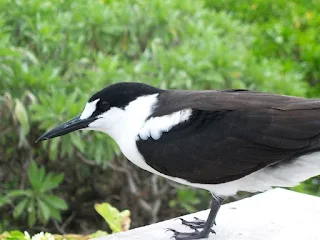Guano Wars: The Bird Droppings Battle for Juan de Nova Island
Juan de Nova Island is a claimed Guano Rich French island.
The relationship between France and Madagascar is of colonialism. Historically, Madagascar was a French colony, and this colonial legacy; however, in the post-colonial era, France and Madagascar have maintained diplomatic ties. However, their relationship has seen occasional tensions, particularly concerning territorial disputes in the Indian Ocean over Juan de Nova Island.
The scattered islands, a group of small islands in the Indian Ocean, have been a subject of dispute between France and Madagascar for several decades, with the Juan de Nova Island being a major point of contention. The conflict between the two countries over the sovereignty of these islands has been ongoing and has involved diplomatic efforts and legal proceedings in international forums.
 |
| Sooty Tern is a guano money-maker |
Birds and Border Brawls: Juan de Nova Island Guano Money
Juan de Nova Island is a wildlife sanctuary located in the Indian Ocean between Madagascar and Mozambique. This small island, approximately 4 miles in length and 1 mile in width, is surrounded by coral reefs and lush forests covering nearly half of its terrain. Largely consisting of native tree species, shrubs, and coastal vegetation, Juan de Nova Island plants play a vital role in providing habitat and shelter for the island's bird populations and guano.
Juan de Nova Island is named after Juan de Nova, a 15th-century Spanish navigator and explorer. Juan de Nova is particularly known for his involvement in the Portuguese discoveries along the African coast and the Indian Ocean. Its historical journey has led it to become a possession of France since 1897, despite being geographically closer to Madagascar.
Over the years, Juan de Nova Island has played a crucial role in the region's economy due to its rich guano and phosphate deposits. Annually, up to 12,000 tons of guano are extracted from this resource-rich land.
Guano is a valuable natural resource consisting of the accumulated excrement of seabirds and bats. It is rich in nitrogen and phosphates, making it an excellent fertilizer. The island's ecosystem includes many seabird species, with notable populations of sooty terns, brown noddies, and white-tailed tropicbirds. These birds use the island as a nesting site, taking advantage of its remote and protected environment.
Workers carefully extract guano from designated areas on Juan de Nova Island and shovel it into containers or bags for transport. The collected guano is then flown off the island using its only airstrip or transported using cargo containers. Once containerized, the guano is loaded onto airplanes or cargo ships for transport.
Earnings from Juan de Nova Island Guano Extraction
The income generated from guano extraction on Juan de Nova Island significantly contributes to the financial resources of the French government, as the island falls under French administration. This resource-rich land is a prolific source of guano, with an annual yield of approximately 12,000 tons.
Guano is a valuable commodity, fetching an average market price of around USD $2.50 per pound. As a result, the island's guano exports translate to a substantial income of roughly sixty million dollars each year. This revenue plays a crucial role in sustaining various aspects of the island's operations, including the maintenance of the island, support for its military garrison, and other related expenses.
Juan de Nova Island is home to a modest French military garrison responsible for maintaining the island's security and overseeing all aspects of guano collection. The garrison is typically equipped with barracks, facilities for training, and command structures necessary to ensure the readiness and effectiveness of French military units deployed there.
It's important to note that although Juan de Nova Island is claimed by Madagascar, it is administered by a high commissioner of the French Republic, who resides in Reunion, a nearby island also under French jurisdiction.
Juan de Nova Island is geographically close to Madagascar, lying in the Mozambique Channel, which separates Madagascar from the African mainland. This geographic proximity has led to claims of territorial sovereignty based on the principle that islands near a nation's coast should fall under its jurisdiction. Madagascar and France have had ongoing diplomatic discussions and negotiations regarding Juan de Nova Island.
Did you Know?
The scattered islands of the Indian Ocean are small islands located near Madagascar, which have been administered by France for over a century and are now part of the French Southern and Antarctic Territories. These islands include Europa Island, Bassas-da-India Island, Juan-de-Nova Island, the Glorious Islands (composed of Grande Glorieuses Island and Lys Island), and Tromelin Island. These islands represent a part of France's overseas territories and are situated in the Indian Ocean.
